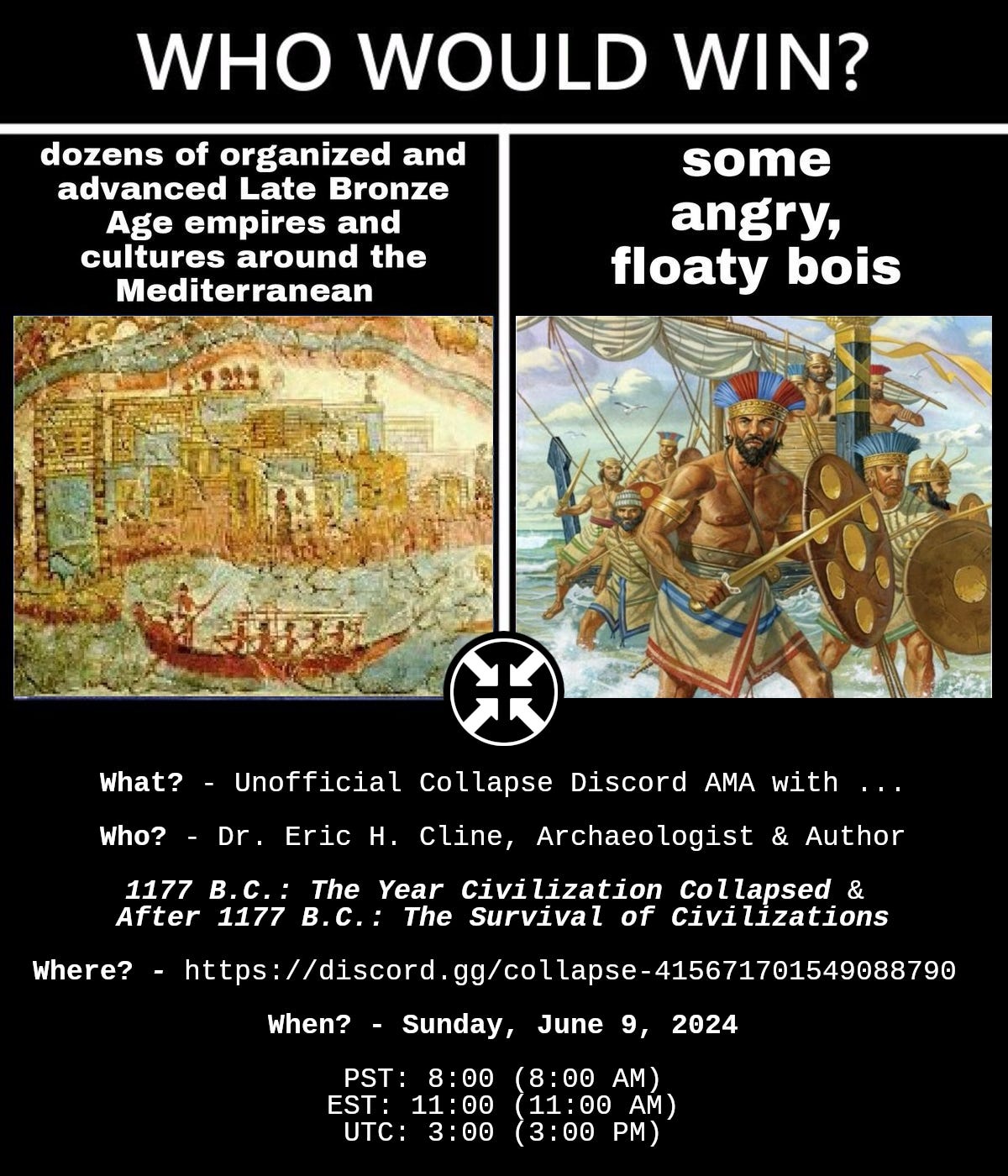AMA with Dr. Eric H Cline, Archaeologist and Author of 1177 BC: The Year Civilization Collapsed & After 1177 BC: The Survival of Civilizations – Sunday, June 9, 2024 [Details Inside!]
—
What? - Collapse Discord AMA with …
Who? - Dr. Eric H. Cline, Archaeologist & Author
Where? - https://discord.gg/collapse-415671701549088790
Here’s a direct link to the AMA Event: https://discord.gg/UPVzA3YT?event=1247651606942711932
When? - Sunday, June 9, 2024
PST: 8:00 (8:00 AM)
EST: 11:00 (11:00 AM)
UTC: 15:00 (3:00 PM)
—
Ladies and gentlemen, boys and girls, gather ‘round – for this upcoming Sunday, I’d like to invite you all to the performance of a lifetime. From an assortment of a few bright minds kind enough to host this “Ask Me Anything” on the Unofficial Collapse Discord, I am pleased to announce our collective guest of honour: Dr. Eric H. Cline. To quote:
An archaeologist and ancient historian by training, Dr. Cline’s primary fields of study are biblical archaeology, the military history of the Mediterranean world from antiquity to present, and the international connections between Greece, Egypt, and the Near East during the Late Bronze Age (1700-1100 BCE). He is an experienced and active field archaeologist, with more than 30 seasons of excavation and survey to his credit since 1980 in Israel, Egypt, Jordan, Cyprus, Greece, Crete, and the United States.
He is perhaps best known for his work on collapse and resilience in the ancient world, specifically at the end of the second millennium BCE and the early first millennium BCE in the Aegean and Eastern Mediterranean, epitomized by the best-selling [book], 1177 BC: The Year Civilization Collapsed (Princeton 2014; revised edition 2021).
I first learned of Dr. Cline’s work a few years back investigating the digital annals of YouTube. Set in the dry lecture halls of academia, I was enthralled by a video detailing his thorough exploration of the decline and fall of various eastern Mediterranean societies (such as the Myceanean Greeks and the Hittites) during the twelfth century BCE,
Otherwise known as the Late Bronze Age Collapse, Dr. Cline’s video lecture (and decade-old magnum opus) tells the story of how this intertwined and interconnected network of various city-states, empires, and political entities found their fate all bound together as they faced down a complex polycrisis of historical proportions: earthquakes, famines, droughts, internal rebellions, external invasions, and the eventual decline and dissolution of international trade. Those decades of turmoil and devastation most famously culminated in the Battle of Djahy between the forces of Ramses III and the mysterious and misunderstood Sea Peoples – and I’m even told that in the end, the Pharaoh’s victory was quite the relief for the Egyptians!
If you ever get a chance, I’d recommend taking a peek at 1177 BC – it’s delightfully detailed, and serves as one of the most comprehensive yet accessible histories associated with the Bronze Age collapse. In more recent times, however, Dr. Cline has turned his attention to what comes afterwards. As he notes near the end of 1177 BC, “one of the most interesting and fertile fields of current research on the ancient world lies in the consideration of what happens after civilization collapse, “beyond collapse”, but this is a topic for another book.”
For those seeking to learn more on his latest book, After 1177 BC, I’d recommend taking a look at one of his most recent interviews with Slate: Is It Possible to Have a “Positive Collapse”? As noted in the interview, “in this book, he portrays collapse as a disruptive but also potentially creative force that can seed revolutions and renaissances—perhaps even necessary for civilizations to advance in a cyclical pattern of integration and fragmentation over centuries and millennia.”
If you do have any potential questions, feel free to list them below, and I’ll do my damnedest to make sure they make it to the hands of our AMA hosts by Sunday morning!
And even if you don’t, I’m certain that you were born with a sense of curiosity just waiting to be sated. Just take a seat with the rest of us in the digital audience, and enjoy this rare chance to participate in this historical lecture and Q&A period.
I hope to see you all there!
:)




